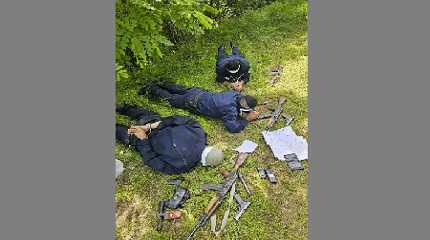
BELGRADE, Serbia (AP) — Serbian prosecutors on Friday opened legal proceedings against three Kosovo police officers arrested earlier this week, defying U.S. and other demands for their immediate and unconditional release.
Serbian officials have said the three Kosovo Albanians were arrested by Serbian security on Wednesday deep inside Serbia and close to the border with Kosovo, and that they were heavily armed when seized. Kosovo officials insist they were “kidnapped” inside Kosovo and taken to Serbia by force.
The dispute adds to tensions between the two countries that have flared into recent violent clashes in the Serb populated northern Kosovo, stirring fears of a renewal of the 1998-99 conflict in Kosovo that left more than 10,000 people dead, mostly Kosovo Albanians.
The United States on Thursday joined calls from the European Union and other Western countries on both Kosovo and Belgrade to “take immediate steps to deescalate tensions.”
“That includes the unconditional release of the three detained Kosovo police officers,” the U.S. State Department said.
Serbian prosecutors said Friday that the three Kosovo Albanian officers are suspected of illegal possession of “arms and explosive materials” and ordered them formally detained, Serbia’s state RTS broadcaster said.
Gabriel Escobar, a U.S. envoy for the Balkans, said the three should be released because they most likely were abducted inside Kosovo, or they “inadvertently crossed the boundary.”
“They had no intention to be in Serbia,” he said.
In a statement late Thursday, the NATO-led peacekeepers gave no conclusions whether the three Kosovo police officers were “kidnapped” as Pristina says or “arrested” in Serbia as Belgrade says.
“We call on both parties to immediately reduce tensions and refrain from unilateral actions that could lead to further escalation,” the statement said. While the international peacekeepers, known as KFOR, monitor the border between the two states, Kosovo police can only check the surrounding area and crossings.
The latest incident further raised tensions between Serbia and its former province. Serbia had put its troops on the border on the highest state of alert amid a series of recent clashes between Kosovo Serbs on one side, and Kosovo police and NATO-led peacekeepers on the other.
Tensions flared anew late last month, including with violent clashes, after Kosovo police seized local municipality buildings in northern Kosovo, where Serbs represent a majority, to install ethnic Albanian mayors who were elected in a local election in April after Serbs overwhelmingly boycotted the vote.
The tensions persisted Friday with three shock grenades exploding near Kosovo police stations in the north of the country, and with Kosovo Serbs staging protests in front of municipality buildings.
Serbia and its former province Kosovo have been at odds for decades, with Belgrade refusing to recognize Kosovo’s 2008 declaration of independence.




